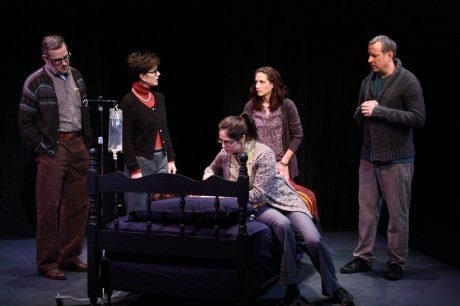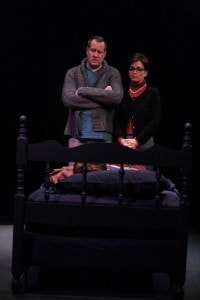The precarious balance of a family on the edge of loss is a profound thing. Their struggle to come to terms with what is happening and how to fill the void of the loved one that is dearly departing is a dizzying collision course with reality and what emerges is a delicate fragile state of existence that can only grow stronger.

Such a notion is what drives Daniel MacIvor’s The Soldier’s Dream. Presented through Iron Crow Theatre Company with Director Steven J. Satta-Fleming, this production hits home on many levels for the audience. We all have a loved one whom without our lives would have a large gaping hole, we have all lost someone that was close to us and impacted our life in that personal, precious way. This show reminds the audience that life is not over when loss strikes, and most importantly to cherish the special moments you have with your loved ones.
The production takes place in David’s apartment, and when we enter the scene he is already in a coma in his final days of life. The show then revolves around his family: two sisters, a brother-in-law, and his lover, Richard, coming and going and sharing their fondest memories of him with each other and with the audience. There are also flashes of David’s most vivid memories, the ones he takes with him into death; an encounter with a young German student during his time spent in Ottawa. The staging for these scenes between David and German student are well placed. Director Steven J. Satta-Fleming lines these two actors up, side by side with a space in between and for the most part they face the audience straight forward, but speak as if the audience were the other person. It is a unique choice that really involves the audience in their conversations and intimately invites them into those stolen moments that David shares with this man.
The thread that flows between each of these characters is the special private personal thing they each share with David (Paul Wissman). Each of the characters shares a touching anecdote in their own special way, all relating to that sacred bond they share with the passing loved one. Wissman as David shares with the audience his most intimate special moments, those moments that transcend life as he slips from it. His character is quiet and somewhat shy, we never see any of his interactions with anyone outside of The German Student (Rich Buchanan) and must rely solely on the descriptive encounters of others to develop his character.
To Wissman’s credit what we do see of him is an endearing portrait of an awkward flirtatious young man. In his scenes with Buchanan he builds a budding relationship through uneasy moments of tension that melt into moments of connection. Wissman reveals his whole world, or what mattered of it, through simple gestures like glancing nervously at his shoes when flirting with Buchanan and twirling the cigarette between his fingers; a nervous but calming gesture to help him keep his focus. Buchanan masters a broken German accent giving his character a foreign rough-around-the-edges feel. His interactions with Wissman are equally awkward yet flirtatious and grow to be endearing as well as heartfelt.
The anecdotes, while similar in nature, come with their own special presentation as each character tells them. The caution here, and perhaps the only let down of the show is that these anecdotes come a little too quickly. It’s not that they are delivered or spoken too fast, in fact Tish’s monologue during both appearances seems to drag unnaturally, but that they come one on top of the other with scenes that feel almost superfluous in-between. While the nature of events and the stories themselves are engaging, there seems to be some unknown disconnect between them which creates an awkward pacing to the show. It’s not too fast or too slow, just staggered and offbeat.

Tish (Marsha Becker) tends to ramble through her monologue when fondly remembering her childhood with David. But despite Becker’s rambling this story comes out agonizingly slow, an uncomfortable pace that really lets the material sit for too long in the air, letting it feel stale and by the time she has finished you wonder what she started with. Becker does however have a compelling moment shared with Richard (Joseph Ritsch) when they finally bond. Up until this point in the show both Becker and Ritsch share the stereotypical relationship that the bitchy older sister conducts with the even bitchier boyfriend of her brother. But they both start speaking in unison, begrudging the same people, sharing the same annoyances of other family members, and it’s a shocking moment as their voices crescendo into one sound, racing through description after description of why they are the way they are in regards to the others. This, save for a picturesque surprise at the end of the show, is the most enticing moment in the production.
There are moments of shared happiness, like the misunderstanding of Sam’s (Steve Sawicki) poetry. As Tish’s husband – his role in the family is already awkward as he’s just an in-law. But there is bonding to be had with the younger sister Judy (Karin Crighton) because she too is somewhat out of place, always in her own little world. Crighton and Sawicki blend their separation from the family into a fond friendship, even if it is subtle, displayed through quiet interactions and simple nods and glances.
The piece is the perfect length for something so emotional, even if it does have a sense of disconnectivity. There is just enough time to absorb everything, process it and experience it; yet it isn’t long enough to truly depress you or make you leave the theatre feeling awfully sad. It is the perfect balance of emotion and action met with a powerful driving notion behind it. So if David had his way you’d all be dancing; dancing your way down to The Baltimore Theatre Projects to see the Iron Crow Theatre’s production of The Soldier’s Dream.
Running Time: 75 minutes, with no intermission.
The Soldier’s Dream plays through April 21, 2012 at Iron Crow Theatre Company at The Baltimore Theatre Project – 45 West Preston Street, in Baltimore, MD. Purchase your tickets at the door (cash or check only), or online.




